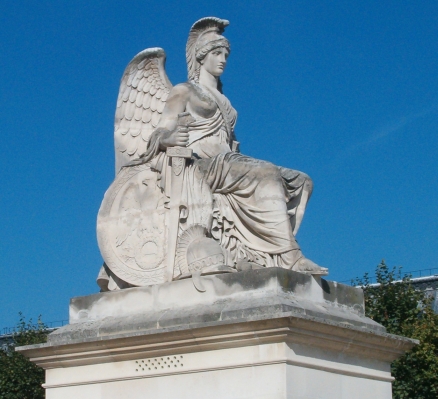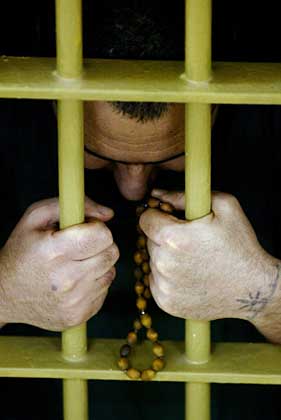The True North
Still trying to get over the jet lag, but I’m back from Europe, with a changed perspective. My experiences there and the reading I’ve been doing have me more convinced then ever that what we need in this country is a uniquely Canadian approach. That the childish divisions between left and right, liberal and conservative, are incapable of explaining our situation or guiding our course. (Alevo: “What is ‘the left?’ Are they a team? A party? A rock band?”) And that the mythology of Western civilization is also powerless to guide us forward.
That mythology is on full display in Paris, to a degree I never imagined – in fact, I had never really realized just how powerful this mythology was to Europeans in previous centuries, or how pervasive it is over there. It involves two main elements: Christianity, symbolized mainly by angels and crosses, and military supremacy, symbolized mainly by horses and swords. These two themes are commonly combined in the sword-wielding angel, who appears in various forms in statues, paintings, and cathedrals.

The beauty of this mythology, and the throngs of tourists – myself included – oohing and aahing over it made it easy to forget that it’s dead. Dead painters, dead architects, dead sculptors, creating things funded by dead rulers. Based on beliefs that are also dead. The churches of Paris are filled with more tourists than believers. The great cathedrals of Notre Dame and Sacre Coeur each appeal for funds from the many tourists, each sell candles, each have tawdry vending machines selling medallions as they try to scrape up funds. The sword-wielding angel no longer protects the West, so the West no longer pays for her services.
Not every marvel in Paris is dead, of course. Their most impressive modern creation, and the one most worth imitating here, I think, is the public transportation system. This efficient system of trains and buses is simply incredible. But for visitors to the city, this modern marvel is just a way of getting to more dead stuff. We tourists are there to marvel at the past, not to be inspired by the Parisian present.
Perhaps because we can’t rely on the mythology of the past, we insist on creating new mythologies for the present. Left versus right, liberals versus conservatives: the constant battle between these ill-defined mythical forces eats up probably billions of words a day on thousands of blogs. It’s irritating, boring and pointless. Most of the time it doesn’t even make any sense. What is the connection, for example, between abortion and taxation? Why is it that when someone announces they are a left- or a right-winger, we automatically know where they stand on both of these issues? Instead of making up our own minds, we buy complete packages of beliefs and ideas. Does that easy way out really make sense?
Canada needs a different approach. An approach that recognizes the complexity and simplicity of our situation. Complexity in that we live in one of the world’s most unique societies. Simplicity in that we are still able to pose simple questions about it. Does it make sense to allow production of essential goods like steel and food to shift to other countries whose long-term cooperation or stability is not guaranteed? Should Canadians pay more for gas when hurricanes hit the gas production facilities of other countries, when we have the world’s second-largest proven reserves of oil?
Can we separate questions like these from ideologies – “free trade”, for example, or “globalization” – in order to come up with reasonable, common sense policies?
I think we can. In Canada we have a unique opportunity: a country where the Western experience and freedoms are combined with a variety of non-Western cultures, including those of our native peoples. A country flexible enough to allow experimentation, new ideas, new ways of being. We can show the way.
That attitude, although it might be bold, is not arrogant. The truth is that the way forward must be shown. The West is mired in confusion and stagnation. The European dream of integration is disintegrating. France is certainly not showing the way. The United States has its own well-publicized problems. Canada stands at a cross-roads: accept the ideas of others, or take the lead and forge a new society. Not Western or Eastern, instead, Northern.
The true North, strong and free. An example for the world!

 twitter.com/adriandz
twitter.com/adriandz
